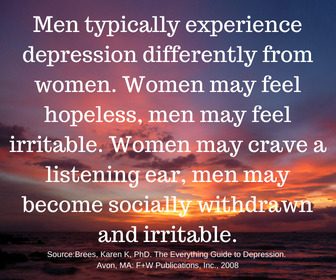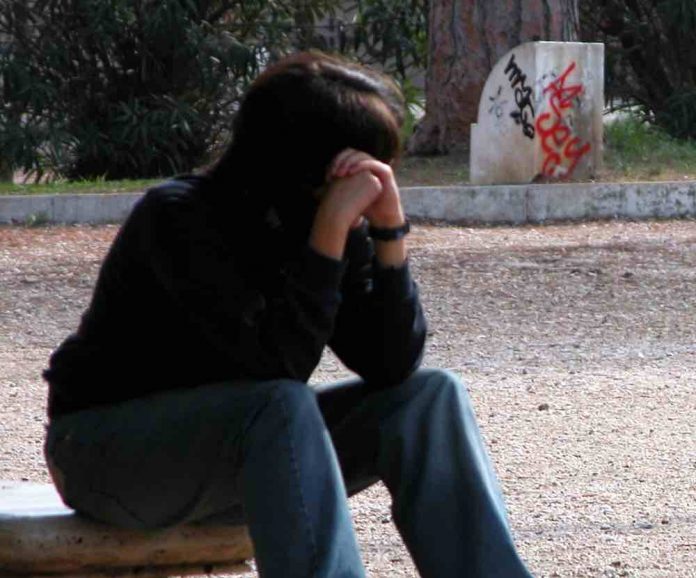Depression is a physical illness
–Terry Bradshaw
By Dr. Eleanor Host, MD
Spring is finally here—the buzzards are back, and I see robins fighting for territory in my yard. As we come out of winter, now is a good time to check in with friends and family and see how their mental health is doing. It seems that getting through a dark and cold winter, only to find that your living situation didn’t also automatically change with the seasons can bring on depression, mood swings, and poor sleep. There is often a spike in suicides and hospitalizations for depression in the spring.
Depression affects about 9 percent of the US population, so of your 100 people you know, about 9 of them probably have suffered with it. People with depression can often hide it for short periods of time, so it can be hard to spot in friends who you don’t see often.
Subtle Signs
What are some signs of depression? Certainly, loss of interest in usual activities is noticeable. Not sleeping as well can be another sign. It can include having difficultly falling asleep as well as waking up very early. Waking up frequently at night can also happen. Appetite might change—people may either eat a lot less than usual or eat a lot more than usual (to try to make themselves feel better). They might start using more recreational drugs including alcohol in an effort to improve their mood. They may be more irritable than usual, and usually will show some sort of personality change.
Someone has to exhibit signs of depression for 2 weeks or longer to meet the criteria for being labeled as depressed in the medical community. Sometimes you just have a bad week, and you can bounce back ok from that. Later signs of depression include withdrawing from social activities, not maintaining personal hygiene, crying frequently, strong feelings

of guilt, and lack of pleasure in any activities. Warning signs of suicide risk are history of attempting suicide before, talking about suicide, and suddenly acting more cheerful out of the blue. Sometimes when a person has decided to commit suicide they feel like they are finally motivated to do something, soon the pain will end, and act cheerful all of a sudden. It does take a few weeks to change your brain chemistry, so if you see that sudden behavior change try to get the person help right away.
Immediate Care, Lifestyle Relief
How can you get help for depression? If you or a friend or family member are actively thinking about suicide, please go to the nearest Emergency Department. They are well equipped to get you the help you need right away. It is not any different than if you were having chest pain! If you are not having suicidal thoughts, you should be able to see your primary care doctor. If they can’t see you soon enough, you might need to call around to find someone who can. You can also try contacting Rescue Health, the Zepf Center, or Unisom if you don’t have insurance or a doctor that can see you.
Most of the time, depression can be treated with medications. There are a wide variety of medications that can help. It can take anywhere from 2 to 4 weeks to feel the effects, so it is important to help yourself with other means as well. Try to socialize more, even if you don’t feel like it. Humans are social animals and isolation in and of itself can lead to feeling more down. Counselling using a technique called Cognitive Behavioral Therapy has been shown to be very effective in changing your brain. Getting on a regular sleep schedule can also help your brain heal. Exercise for a total of 30-45 minutes a day has also been shown to help your brain reset itself. It doesn’t’ have to be all at once, you can do 3 sets of 10 minutes a day. Mindfulness meditation can help calm your anxieties and also rejuvenate your nervous system. Acupuncture can also help especially with sleep or anxiety issues. It can help reset the brain back to your more normal self.
 Eating a healthy diet really seems to help mood as well. There is a lot of new research being done about the bacteria that live in your gut, called the gut microbiome. These bacteria help us digest our food, but also communicate with our nervous system by sending out chemical signals. Different bacteria seem to do different things. The population is different depending on what foods you eat, and of course, the more natural foods you eat, the better the population seems to be. They have shown that they can actually make mice depressed if they take a stool sample from a depressed person and transfer it to the gut of the mouse. So, if you can try to eat more varieties of vegetables and fruits, and less “junk food” and simple sugars, you can actually change the bacteria and improve your mood. A study was just published that showed people who changed their diet showed more improvement in their mood than people who socialized more to try to improve their mood. You are what you eat!!
Eating a healthy diet really seems to help mood as well. There is a lot of new research being done about the bacteria that live in your gut, called the gut microbiome. These bacteria help us digest our food, but also communicate with our nervous system by sending out chemical signals. Different bacteria seem to do different things. The population is different depending on what foods you eat, and of course, the more natural foods you eat, the better the population seems to be. They have shown that they can actually make mice depressed if they take a stool sample from a depressed person and transfer it to the gut of the mouse. So, if you can try to eat more varieties of vegetables and fruits, and less “junk food” and simple sugars, you can actually change the bacteria and improve your mood. A study was just published that showed people who changed their diet showed more improvement in their mood than people who socialized more to try to improve their mood. You are what you eat!!
Try to eat healthy, get exercise, get 7-8 hours of sleep a night, and socialize a little more if you are feeling blue. If you are truly depressed, please don’t hesitate another minute and get help!
Dr. Eleanor Host is a Board Certified family physician, licensed in Ohio and Michigan. She was trained in acupuncture in 2000 through the Helms Medical Institute and has been in

Whole Family Medical Care
successful practice for over fifteen years. Dr. Host has expertise in Scalp Acupuncture, Percutaneous Nerve Stimulation, Five Energy Balancing, and Meridian Channel Flow. She maintains her membership in the American Academy of Medical Acupuncture and completes regular training classes.
- Graduate of Northeastern Ohio Universities College of Medicine (NEOUCOM), 1992
- Post graduate residency training at WW Knight Family Practice/The Toledo Hospital graduated 1995
- Independent solo practice since 2000 (previously Affiliated with Mercy Medical Group)
- Certified Physician’s Assistant on staff
- Certified Acupuncture Specialist since 2000 – Over 300 hours training at UCLA
- American Academy of Family Physicians
- Wilderness Medical Society
- Board Certified in Family Medicine (current with maintenance of certification)







